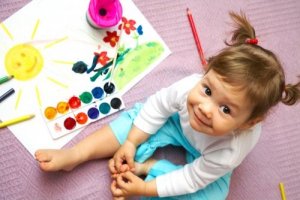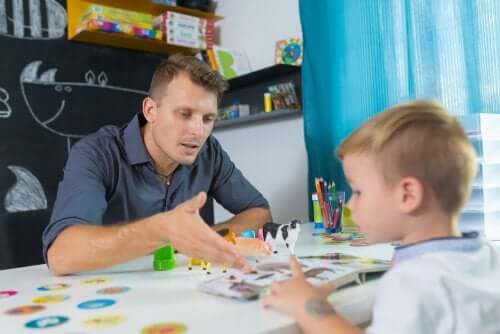The Pedagogy of Jean-Jaques Rousseau


Written and verified by the pedagogue and trainer María Matilde
Placing children at the center of attention within the educational process is the central idea of the pedagogy of Jean-Jaques Rousseau. He exposed his pedagogical theory in one of his most recognized works, Emile, or On Education (1762). This book is a philosophical treatise about the nature and education of man.
The political, social and philosophical thought of Jean-Jaques Rousseau
Born in Geneva on June 28, 1712, Jean-Jaques Rousseau was a pedagogue, philosopher, musician, and botanist. His political ideas formed a substantial part of the theoretical grounds of the intellectual and cultural movement of the Enlightenment. Later on, they were also an important factor in the French Revolution.
In his political thinking, Rousseau defended the Republican State as the only form of government. He exposed his ideas in his work The Social Contract, or Principles of Political Right (1762).
He wrote that in this context: it should be the people who have the sovereignty and general will to legislate. According to Rousseau, this was a way to guarantee the common good of a nation’s citizens.

Jean-Jaques Rousseau made a major contribution to pedagogy with his philosophical thinking in regard to education – which was, of course, in line with his political and social philosophies.
So, in Emile, or On Education, he suggests a natural evolution in children and adults, who he points out as being noble by nature. We also wrote about the need to form children to be able to face and fit into a society which he describes as corrupt.
The pedagogy of Jean-Jaques Rousseau: The goodness of man and of nature
Rousseau’s pedagogy suggests and describes an educational system that considers the natural evolution of children and man as a way of adapting to and improving society. Furthermore, he sustained that teaching should occur within and in contact with nature. He based this claim on the idea of the goodness of both man and nature.
In this sense, to maximize a child’s development, education should follow the rhythm of nature and not of society. What’s more, it should place importance on the interests of children, respecting their condition as children and not as adults.
Rousseau suggested an education organized into periods. The first he characterized by mostly physical education, which would last up to 4 years of age. Then, between the ages of 2 and 12, he suggested an education focused on the development of the external senses.
Furthermore, between the ages of 12 and 15, children were to partake in intellectual education. And finally, from 15 years until adulthood, children would learn moral education.
The fundamental pillars of Jean-Jaques Rousseau’s pedagogy
- The defense of an education that takes into account the nature of children and the particularities of their age.
- An education that must develop by means of the organs of the senses. What’s more, it should develop out of an individual’s experience with nature and the things and people that surround them.
- The defense of the liberty of man. This means being against any type of education that is rigid, severe or based on punishment.
- An educational didactic based on the development of children’s independence and ability to observe and to comprehend their surroundings… submitting to the laws of nature. The same is true when it comes to relationships among people.
- Teachers must follow a principle of “no intervention.” In other words, they should “do everything without doing anything.” This means that the role of an educator is to serve as a guide in the teaching-learning process.

- The teaching of different types of jobs, either handicrafts or agricultural tasks, as a means of learning occupations and useful skills. This is the way in which a man can earn a living and safeguard his freedom.
- Once children reach the age of 16, they must return to society. Their moral education must prepare them to perform good deeds. Whereby, their moral education should be based on good feelings, good judgment, and good will.
- Rousseau suggests the need for sex education after the age of 16 or 17. He further suggests avoiding talking about religion during childhood. Rather, he considered that children would gradually acquire knowledge about the divine on their own. Furthermore, Rousseau promoted a religion of the heart, rather than one based on religious truths.
Jean-Jaques Rousseau’s legacy
Active teaching within nature, the consideration of the interests and particularities of children, and the defense of liberty… The consideration of the formation of men of good feelings… And the need to carry out good deeds in order to live in a society in need of improvement. These are some of the main educational and philosophical ideas that Rousseau developed.
Like the contributions of other educational thinkers, the pedagogical conceptions of Rousseau meant great advances and changes in his time. His most progressive ideas have made way for the more democratic and complex pedagogical conceptions that exist today.
Placing children at the center of attention within the educational process is the central idea of the pedagogy of Jean-Jaques Rousseau. He exposed his pedagogical theory in one of his most recognized works, Emile, or On Education (1762). This book is a philosophical treatise about the nature and education of man.
The political, social and philosophical thought of Jean-Jaques Rousseau
Born in Geneva on June 28, 1712, Jean-Jaques Rousseau was a pedagogue, philosopher, musician, and botanist. His political ideas formed a substantial part of the theoretical grounds of the intellectual and cultural movement of the Enlightenment. Later on, they were also an important factor in the French Revolution.
In his political thinking, Rousseau defended the Republican State as the only form of government. He exposed his ideas in his work The Social Contract, or Principles of Political Right (1762).
He wrote that in this context: it should be the people who have the sovereignty and general will to legislate. According to Rousseau, this was a way to guarantee the common good of a nation’s citizens.

Jean-Jaques Rousseau made a major contribution to pedagogy with his philosophical thinking in regard to education – which was, of course, in line with his political and social philosophies.
So, in Emile, or On Education, he suggests a natural evolution in children and adults, who he points out as being noble by nature. We also wrote about the need to form children to be able to face and fit into a society which he describes as corrupt.
The pedagogy of Jean-Jaques Rousseau: The goodness of man and of nature
Rousseau’s pedagogy suggests and describes an educational system that considers the natural evolution of children and man as a way of adapting to and improving society. Furthermore, he sustained that teaching should occur within and in contact with nature. He based this claim on the idea of the goodness of both man and nature.
In this sense, to maximize a child’s development, education should follow the rhythm of nature and not of society. What’s more, it should place importance on the interests of children, respecting their condition as children and not as adults.
Rousseau suggested an education organized into periods. The first he characterized by mostly physical education, which would last up to 4 years of age. Then, between the ages of 2 and 12, he suggested an education focused on the development of the external senses.
Furthermore, between the ages of 12 and 15, children were to partake in intellectual education. And finally, from 15 years until adulthood, children would learn moral education.
The fundamental pillars of Jean-Jaques Rousseau’s pedagogy
- The defense of an education that takes into account the nature of children and the particularities of their age.
- An education that must develop by means of the organs of the senses. What’s more, it should develop out of an individual’s experience with nature and the things and people that surround them.
- The defense of the liberty of man. This means being against any type of education that is rigid, severe or based on punishment.
- An educational didactic based on the development of children’s independence and ability to observe and to comprehend their surroundings… submitting to the laws of nature. The same is true when it comes to relationships among people.
- Teachers must follow a principle of “no intervention.” In other words, they should “do everything without doing anything.” This means that the role of an educator is to serve as a guide in the teaching-learning process.

- The teaching of different types of jobs, either handicrafts or agricultural tasks, as a means of learning occupations and useful skills. This is the way in which a man can earn a living and safeguard his freedom.
- Once children reach the age of 16, they must return to society. Their moral education must prepare them to perform good deeds. Whereby, their moral education should be based on good feelings, good judgment, and good will.
- Rousseau suggests the need for sex education after the age of 16 or 17. He further suggests avoiding talking about religion during childhood. Rather, he considered that children would gradually acquire knowledge about the divine on their own. Furthermore, Rousseau promoted a religion of the heart, rather than one based on religious truths.
Jean-Jaques Rousseau’s legacy
Active teaching within nature, the consideration of the interests and particularities of children, and the defense of liberty… The consideration of the formation of men of good feelings… And the need to carry out good deeds in order to live in a society in need of improvement. These are some of the main educational and philosophical ideas that Rousseau developed.
Like the contributions of other educational thinkers, the pedagogical conceptions of Rousseau meant great advances and changes in his time. His most progressive ideas have made way for the more democratic and complex pedagogical conceptions that exist today.
All cited sources were thoroughly reviewed by our team to ensure their quality, reliability, currency, and validity. The bibliography of this article was considered reliable and of academic or scientific accuracy.
- Fernández, Tomás y Tamaro, Elena. (2004) «Biografía de Jean-Jacques Rousseau». En Biografías y Vidas. La enciclopedia biográfica en línea. https://www.biografiasyvidas.com/biografia/r/rousseau_jeanjacques.htm
- Gutiérrez-Pozo, Antonio. (2023). Aproximación filosófica a la pedagogía paidocéntrica. Sophia, Colección de Filosofía de la Educación, (34), 159-179. http://scielo.senescyt.gob.ec/scielo.php?script=sci_arttext&pid=S1390-86262023000100159
- Lloret, J. L. (2014). Jean-Jacques Rousseau y la cultura del diseño. Agora: papeles de Filosofía, 33(2). https://revistas.usc.gal/index.php/agora/article/view/1915
- Marroquín, I. (2022). Emilio o de la educación, de Rousseau. Revista Salud Y Desarrollo, 3(1), 72-78. http://revista.ieproes.edu.sv/index.php/Investiga/article/view/72
- Peña, A. K. R., Gaviria, D. A. M., y Cruz, C. O. (2015). Relaciones del saber sobre la educación y la formación (pedagogía) y del saber sobre lo humano (antropología) en Comenio, Rousseau y Kant: Aportes de la antropología pedagógica. Pedagogía y Saberes, (43), 9-28. https://revistas.pedagogica.edu.co/index.php/PYS/article/view/3864
- Rousseau, J. J. (2023). El Contrato Social. Editorial Alma.
- Urrea, W. S. (2010). La concepción pedagógica en Rousseau y Goethe. Itinerario educativo, 24(55), 145–158. https://dialnet.unirioja.es/servlet/articulo?codigo=3438638
- Villar Ezcurra, A. (2015). Bondad, compasión y virtud: Claves de las propuestas educativas de Rousseau. Historia y memoria de la educación: HMe. https://revistas.uned.es/index.php/HMe/article/view/14283
This text is provided for informational purposes only and does not replace consultation with a professional. If in doubt, consult your specialist.








